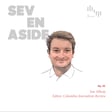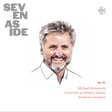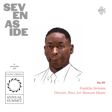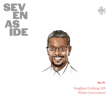Become a Creator today!Start creating today - Share your story with the world!
Start for free
00:00:00
00:00:01

TH Brent Latham
The outgoing mayor of North Bay Village—future home to the Argentine FA—on his sweeping NBV100 master plan, a city on the cusp of a "renaissance," the premium on greenspace, and what makes for real progressivism and impactful civic leadership
This episode is part of a spotlight on Miami for Kit Magazine's series on cities and sustainable development: https://kit-magazine.co/football-and-the-global-city/
Transcript
Introduction to North Bay Village
00:00:11
Speaker
Big things come in small packages, which might indeed be the case for North Bay Village, where the island of 10,000 residents in Miami's Biscayne Bay not among the most densely populated cities in the United States, according to its square mileage.
Mayor Brent Latham's Leadership Journey
00:00:22
Speaker
A staggering statistic revealed by its outgoing mayor, Brent Latham.
00:00:26
Speaker
Latham, whose third and final term concludes this year, is a former CONCACAF, an international development executive, who put his city on the proverbial map in 2023 when the Argentine Football Association, the AFA or AFA, announced its first North American outpost there. This, of course, at a time when Argentina's footballing currency was booming both in Miami and worldwide. On one hand, the AFA project is a public-private partnership that reimagines municipal property as a dynamic, shared amenity brimming with ancillary community benefits.
00:00:55
Speaker
As we discovered, however, it's but one spoke in a complete long view strategy and transformation of North Bay Village from tackling water quality issues to fortifying against sea level rise to jump starting a commercial district and promoting cleaner, safer mobility that shook off decades of stale governance and sets the city on a path to what some have deemed a quote, Renaissance. It also speaks to a vision that treats sport and wellness as pillars rather than afterthoughts. It's vision that in fact took shape with a grassroots youth soccer program begun during the pandemic.
Transformative Projects and Rezoning Strategies
00:01:23
Speaker
For the urbanist, North Bay Village and its audacious master plan, known as MBV 100, might conjure the prototypical 15-minute city. For anyone with even an outsider's view of greater Miami and its extraordinary interwoven dynamics, North Bay Village seems in many ways a microcosm. Perhaps most compelling, however, are the lessons learned and challenges navigated by its young, upstart mayor in creating change and building consensus, essentially from scratch. Here in the waning days of his Mayorship, we speak with Brent Latham about the highlights and particulars of his tenure and his NBV 100. Aggressive rezoning, the indispensable role of private capital,
00:01:57
Speaker
the utter premium on green space, possible succession, and the origins of the AFRA project. We also get his thoughts at this crucial junction for politics and the public discourse on true progressivism and what makes for effective civic leadership.
00:02:15
Speaker
Mayor Brent Latham, thank you so much for for being here with us. And we we find you right now in the homestretch of your tenure. ah Take us back six years to 2018. Where was North Bay Village? How did you and the city come together and what compelled you to run for office?
00:02:31
Speaker
First of all, it's great to be with you. um So I've i've been a a resident of the city for about 10 years now, I guess about four or five years before I decided to run for office. um When I looked at North Bay Village, I looked at a city with a lot of potential, this is the city that I live in, my city, a city with a lot of potential, but a city that was having management issues. And this happens ah around certainly around Miami Dade County, I think around the country and a lot of,
00:02:59
Speaker
small or even mid-sized cities. I consider North people should be a mid-sized city. It is in terms of the ranking of population. and Miami-Dade County with about 10,000 residents. um It's difficult to find under the governmental structure qualified people to be in elected office because qualified people generally are busy doing something else, you know working or living their lives, being professionals. And the elected officialdom really does take a lot of time. um I think when I ran for office in 2018,
00:03:32
Speaker
I couldn't have anticipated exactly how much time it would take. It's ended up being a full-time job for the last six years. ah But I think North Bay Village, like all Like all cities, like all government organizations, needs good leadership, thoughtful, proactive leadership.
Geographical Challenges and Infrastructure Plans
00:03:51
Speaker
and The reason that North Bay Village was really in need and one thing that I saw was that you know not only did we have a local government which wasn't running efficiently, wasn't running well, um it it was also not representing our city in the best light.
00:04:05
Speaker
And so that's something that we wanted to take care of. Historically, North Bay Village, three islands in the middle of Biscayne Bay ah that were built on from spoil when the port was dredged in Miami-Dade County in nineteen in the 1940s, rose out of the bay, three islands at sea level, threatened by sea level rise. um That was something that was also compelling to me. i I'm a property owner in North Bay Village, and I wanted to make sure that everything was being done, everything possible was being done to be able to tackle climate change and sea level rise and the flooding that we face in North Bay Village on a day-to-day basis. But at the same time, North Bay Village was a city, I saw it as a city with a lot of potential, but also one that needed good good leadership and good management. And we spent the first couple of years working specifically on leadership management and administration to get things so
00:04:59
Speaker
to the point where they could function correctly. Before you really dig into the projects, you have to have the management side working properly. And we worked very, very hard on that for a couple years. We had to really clean house, um bring in all new staff, new structures. We did that, and then we sort of got going from there. Hmm. Well, once you lay those foundations, you know, I think it's in striking ways, North Bay Village has the makings of what some might call a, quote, 15 minute city.
00:05:27
Speaker
your NBV100 plan and vision for its part would seem to channel the tenets of this sort of framework and thinking. ah Since you've talked given us this this great background, walk us through if you would NBV100 and put some color and context to its main components.
00:05:44
Speaker
Sure. So I think that as I say, as you're planning a city you know or or working in a city, the first thing you have to have is is good administration and good leadership, and that takes some time. So we built those those foundations. ah From there, we said, where where do we go from here? And the a lot of times in in mid or small cities,
00:06:03
Speaker
mid-size or small-size cities, you sort of take projects one at a time. and yeah I think in a lot of places, maybe you have the luxury to do that. you know Today, we'd like a park. We're going to focus on ah on a street. We're going to focus on one project or another.
00:06:20
Speaker
In North Bay Village, we didn't necessarily have the luxury of doing that because the amount of projects that need doing have needed doing are are very are so numerous. Things have not been done here for 70 years. The sewers need upgrading. The stormwater infrastructure is desperately needed. The zoning is out of date. ah There hasn't been investment in basic infrastructure. There are no park there were no parks to speak of.
00:06:44
Speaker
There's no government programming, no recreation programming. This is all when I'm becoming mayor in 2018. And therefore, there's no sense of community. And and also, and from a bigger point of view, from an urban planning point of view, since no one had ever thought constructively about what the city might look like, everything had grown in an organic way that hasn't lent itself to the well-being of the city as ah as a unit, as a community. So what we've ended up with, and and it was really planned this way, from misplanned this way, I should say, from 1945, from many decades ago, is a bedroom community where people drive in and out. And over time, over the over the decades, that has evolved in the middle of Miami-Dade County into an undesirable model for for a community, for a city. um So what we end up with is all of the worst.
00:07:41
Speaker
of of urban planning, you know traffic jams, parking problems, lack of facilities, lack of restaurants, lack of stores. um and so we We took a big look and we said, look, how can we fix this? and The answer is through creative zoning. and If you zone things properly, um especially over time, we saw an opportunity that we have in North Bay Village, which is because Our community in the middle of Miami-Dade County had been overlooked or neglected. And again, we're three islands in the middle of Biscayne Bay. the The location is ideal. We're 15 minutes from everything in Miami-Dade County practically. And people love this place and want to live here.
00:08:17
Speaker
ah But it had been neglected in terms of investment in terms of the infrastructure. And so that aside from being a challenge, we looked at it also as an opportunity.
Zoning and Community Vibrancy
00:08:27
Speaker
If we plan correctly and can attract the right type of investment, then we have an opportunity it' to essentially work with what's close to a blank slate.
00:08:36
Speaker
in terms of building the type of community that we want to build. And what type of community is that in 2020 that people are looking for? It's one that offers locally amenities ah so that you don't have to be, especially after COVID, coming and going every day to work necessarily. You can enjoy your home, enjoy your local neighborhood, but you need the things around you to make it a good place to live. You need parks, you need programming, you need community, you need stores, um and you need access to ah to the things that you want around you in order to make that happen. And so that's that's where the NBB 100 plan comes from. You've spoken of being a water privileged community, which is is certainly ah certainly an understatement. um You have spoken of climate innovation. What are some of the innovations you and your administration have put forward? Well, resili resiliency planning is ah is a challenging one. I mean, I think it's one where there there hadn't been a ton of work done around the time I was becoming mayor in 2018. In the meantime,
00:09:33
Speaker
things have moved rapidly, especially in in places like South Florida and Miami Dade County. um I didn't have any particular understanding of how to tackle resilience planning ah when I became mayor, but I learned very quickly by by ah by talking to people and by having people around us. and The first step was we needed to get the community involved. I tell a ah funny story that people like Where's 2000 probably 2018 2019 and nineteen I was just getting started speaking about resilience and speaking about the threats to our community from sea level rise and climate change and that we needed to to have a plan in place to tackle this and I dealt with a resident and this was
00:10:15
Speaker
this was representative of a certain part of the population who said to me, look Mayor, you have to stop talking about the threat of sea level rise to our community because people are going to find out and that we're threatened by sea level rise and that's going to negatively affect our property values. And so that that sort of short term myopic approach to dealing with sea level rise. I mean, I think it's something people wanted to deny that we were threatened by this, but it's it's it is here. And if we want to live here on the in the long term, then we need certainly solutions and we need to be thinking very actively about how to address the threats to our community from climate change. So um we started by engaging the community. We we put together ah a sustainability and resiliency task force that
00:11:04
Speaker
engaged many of our our residents and they started to think and they started to bring in partners and over time we built a plan and a big part of that plan was the zoning, the MBV 100. What does the zoning of our islands look like going forward for 30, 40, 50 years because we have to take into account more frequent storms. We have to take it into account sea level rise, which means essentially, and this is the challenge, that we have to raise our sea level islands. Now, I don't see it as such a daunting challenge anymore, as I once did, because these islands were built from spoil. If we go back 70, I guess 78, 79 years now,
00:11:44
Speaker
North Bay Village was not here. It was under the water zoopis campaign. And so if we engineer our way out of that once, we can do that again. But it does take foresight and planning um and we need a runway. there's There's a point at which you're too late. ah We're not there yet, but we're we're getting close. So what we did was with MBV 100, one of the the major um administrative changes from that was to change zoning and in three important ways. and i talk about how you People ask, how do you move an island up? right so The way that you do it is you change the zoning. we Again, I mentioned that North Bay Village is blessed in the sense that
00:12:22
Speaker
we haven't had investment. And so there's an opportunity to work with what's close to a blank slate and reinvest in Miami-Dade County. So when with our new zoning, essentially everything needs to be higher. everything Every piece ah of property will need to be higher when it's when it's rebuilt. um Sea walls need to come up and roads and infrastructure also will come up. And so the roads and infrastructure you take care of at the government level, you have a plan and we're working On that plan, we have a $60 billion stormwater bond to work on raising our infrastructure over the coming decades. ah The seawalls are easy. Those are what keep our islands in and you just, every time you rebuild the seawall, you rebuild it higher. um And there are some very, very creative ways to do that. But then the last one is the private property. um And you obviously can't force private property owners to
00:13:12
Speaker
reconstruct their homes higher. But what you can do is change the zoning so that when homes are reconstructed, they are reconstructed higher. And we have the advantage in Miami of having a lot of capital coming into our community for construction, both multifamily and single family. And so the idea is over the coming decades, slowly but surely with the new zoning, the housing infrastructure, both multifamily and single family will be replaced at a higher level to the point at which when we get down the road,
00:13:42
Speaker
30 to 40 years from now and sea level rise has come and is permanent and affecting us on a daily basis. All three of our islands will be high enough to withstand ah the projections. We can also have a conversation about sea level rise projections and what we're able to withstand and what we're not. There's a range of sea level rise projections, everything from the low range to the mid range we're prepared for. On the high end of the range, no one is prepared for that. And that implies a global catastrophe which local plant in North Bay Village is not going to be able to solve. It would be interesting to dig into that a little bit further, but I do want to ask, um you know this you're talking about such an existential undertaking with NBV 100 and also fixing after so many years, if not decades of stagnation, fixing some of the endemic issues. What for you and your administration were pain points? What was some of the resistance that you perhaps weren't expecting?
00:14:37
Speaker
Yeah, I think and and not expecting is right. I think because if you're not an experienced politician, you know you think you're doing the right thing and you don't expect people to object to what you're trying to do, especially as vehemently as people tend to do so. ah But more than that, you know I think in general, and then I'll specifically answer your question, I think in general, one of my biggest surprises in contemporary United States of America in 2000 21, 22, 23, 24 is that people aren't willing to have a dialogue and people aren't willing to speak about things. So so climate change is is one and planning is one of these things. um We have to plan for climate change and we have to have a resiliency plan in our city. It's very obvious. um And yet ah there there is opposition and people
00:15:27
Speaker
don't want to see change so when when you do things like for example in a single family neighborhood you need new homes to be built seven, eight, nine, 10 feet higher up than they are at this time. There are different ways to achieve that. but However you achieve it, it requires rezoning. and What we found was that neighbors would oppose rezoning to build higher homes. and They were scared ah that higher homes would be built that would dwarf their existing homes. and Over time, to some extent, that may be inevitable, but it's a very slow process.
00:16:04
Speaker
and It's one that ultimately reserves results in in preserving the land that we live on, so it's necessary. if There were better solutions than than everyone is amenable to those, but what's interesting in one of the obstacles is just people's stubborn ah opposition to doing anything ah because they think that the solution is not perfect. Now, there's there's not a perfect solution to any of this.
00:16:27
Speaker
ah The best solution is that we didn't have to worry about sea level rise or climate change. But in the face of those challenges, some solution is needed. And getting people to understand and and accept those solutions, especially in a political environment, can be extremely challenging. So that's one thing. And then the next thing is the resources necessary to affect this sort of massive change.
00:16:51
Speaker
um in a city. ah it it It's very expensive. There are resources out there. We're relying on public resources, but we don't want to burden the public with the entire cost of this because it's prohibitively expensive for for taxpayers, especially those who are legacy residents and in the city ah to expect them to pay for these massive changes. and There's also an equity argument ah in terms of who pays for changes that are coming decades down the road. you know I think it's municipal finances.
00:17:24
Speaker
a nuanced and and sort of very specific subject, but I do enjoy talking about this ah at least a little bit in terms of how you pay for things. so Governments tend to like to tax people to pay for things. and it it To me, it's it's it's unfair.
00:17:40
Speaker
to over-tax current residents to pay for future improvements because the current residents aren't necessarily the ones who are going to be living in the city in the future and enjoying those improvements. so What I always try to do is I try my best when setting up financing to advocate for financing that matches the timetable of the expenditures to the source of funds. So if we're talking about future improvements, we want to use bonds that are paid off over time, um because then we're going to be taxing future residents for future improvements. And so that's what we're doing. And then there's a lot of public money out there. There's a lot of a lot of, there's some state money, but a lot of federal money right now for resilience improvements. It's not easy to obtain, but it's out there and available in a large part of our plan.
00:18:26
Speaker
ah relies on obtaining that but that is the you know that one of the bigger obstacles is financing because first you got to get people to buy in and then you got to pay
Sports Initiatives and Community Health
00:18:33
Speaker
for it. Well we actually did talk about some of this with with Mayor Cava but I do want to pivot slightly Sport and soccer football specifically, it would seem, will be a defining feature of your your legacy as it certainly has been of your agenda. Mayor Latham's Youth Open Soccer was a way to get kids out moving and socializing, but it seems to become something more transcendent for the for the community. Speak to football if you would. How how did this all come about? At the highest conceptual level, how does sport for you connect to the broader blueprint?
00:19:05
Speaker
So what we're doing is trying to build community here, and right? And we talked about technical things like zoning and and how do you plan and how do you execute? ah Ultimately, what you're trying to do is build a community.
00:19:17
Speaker
And nothing builds community like engagement with families and kids and schools. And when I came in as mayor, the city had no public recreation program. We had only two small parks. And we took a look at that and we decided also to take an incremental approach to solving that. The first thing that you need to have community and have recreation if you need space. And so we we actually, one day, and this was probably 2018 or 2019, with the city manager, we were looking at the satellite photo of the city, which we look at a lot. And we looked at it and we saw the two the little green spaces. You know, North Bay Village is really starved for space. as ah As I travel around the country and I look, it I go through other cities and a funny thing happens, so i'll I'll be driving along or walking along and I'll look
00:20:09
Speaker
at a big green empty space, you know, and it might be a third of an acre or something. And it's just a green lawn in a public space. And I'm envious of that because North Bay Village doesn't have any space. We are one third of a square mile of dry land. The city is actually about one square mile in size, but two thirds of that are water um and one third is dry land. And we have 10,000 people living on this one third of a square mile of dry land, which is ah in terms of density, depending on how how you measure it, among the top 10 most densely populated cities in the United States. And so we don't have green space. And when we the other thing is that all of the land is spoken for, and it's expensive. So if we want more land, we have to buy it. And we've done that. I mean, one of our policies was whenever we can accumulate land, we think we should do that. um Because moving forward, it it's it's valuable to the community. But when we looked at the satellite photo, the big green space
00:21:06
Speaker
in the middle of our city happened to be the public school. And if you look at the public school, um that in Miami-Dade County, that belongs to the public school system. So that ended up being how how we directed the park program, which was we need to make a deal with the public school to work with them on their on their green spaces in their lands. And we were able to do that. But to sort of double back to soccer and community participation, even before we did that, we got community programming with soccer and with sports going in the parks, because I thought that was important to bring our communities together. And when it really took off, really took off, was at COVID time because the kids were in their houses.
00:21:51
Speaker
They didn't have much to do. Parents were desperate to get their kids out. And so we started, at that time, an overall ah recreation and wellness program for kids that ran I think every day in in our local park and the the you know the demand for it was just overwhelming. People loved it. And that that did transition very quickly into several different programs in recreation. we had you know We have youth programs, we have senior programs, but the one that really took off, and this is no surprise, was the soccer program because so many kids these days, especially in a multicultural ah city like miami like ah Miami, so many of the kids are playing soccer.
00:22:31
Speaker
And so for me, it was important not only to have a soccer program, but also to have a free soccer program. I wanted to be free for all the kids because my experience previous to this as a parent is that high quality soccer instruction was prohibitively expensive. And we can talk about many reasons why that's the case. But for me, it was important for this to be free. And that meant the government would figure out a way to pay for it. it's not prohibitively expensive to the government. you know There are economies of scale. It's very easy to put together a soccer program. What's usually missing is the field to play on. And we actually found that in addition to that, we could bring in outside resources to help subsidize the program and make it essentially free to the city and taxpayers as well. um So that program got started during COVID and it grew. It grew from a few dozen kids to many more. ah And we started getting kids from all over
00:23:23
Speaker
ah all over the neighborhoods here, all over Miami Dade County, ah come to North Bay Village to play soccer, largely because it's free um or subsidized. And so that's that's grown and it's been amazing. People have enjoyed it and it's really been, for our community, something extremely positive to bring together North Bay Village.
00:23:41
Speaker
Well, so fast forward and and enter Argentina and the Argentine F.A., the Football Association, which I think it's safe to say has put the spotlight on North Bay Village in Miami and internationally like never before. On one hand, it's the F.A.'s first ever headquarters and foothold in North America. On the other, it's a signifier, even catalyst for some of the changes we're talking about with with N.B.V. 100 and so forth.
00:24:04
Speaker
um Give us the broad strokes. How is the F.A.'s project a boon for the city in its next chapter and how does it unlock other new opportunities? Sure. ah so yeah I'll circle back to to resources and everything that I that i say.
00:24:18
Speaker
in terms of managing or or being the mayor of the city, not not managing it specifically, but trying to mayor or as best as I can has to do with resources. Who do we get resources from to execute programming? And so again, I told the story of how we were looking at the satellite ah photo and we see the school and there's this huge green space around the school and it's actually somewhat neglected. And this is, you know, Miami Dade County Public Schools has,
00:24:44
Speaker
many, many schools around the county and they do a great job on education. And sometimes their budget has not matched up to keep their infrastructure and grounds up to the standard um that that many would like to see. And so that was the case here with our local school, Treasure Island Elementary School. And that's when we said to the school system that as far back as 2019, I mean, this was one of the first things, first initiatives. We said, you know, we want to enter into a partnership with the school system to help you improve and maintain the grounds of the school because they said you know the the school system is in charge of the buildings and the education and they do a good job.
Green Spaces and Recreational Facilities
00:25:25
Speaker
What we can do is we can improve the grounds and we can maintain them and we can turn them into a community space um which actually multiplies by a factor of tenfold
00:25:34
Speaker
the green space that we have in North Bay Village because of the massive amount of green space around the school compared to the legacy parks in our city. And so that was something we were very interested in. We were able to enter very early into a joint use agreement with them where we do have access for our community to the school grounds after hours. And we came up with a plan to build essentially a community park around the school. Now that community park was to include an athletic field on ah on a very large green space behind the school that they use for athletics, but it's and unfinished. It's just sort of ah a field in its natural state. um The issue was, to do this, we were to you we were going to use park money, bond money, and we only had enough we didn't have enough for the whole
00:26:19
Speaker
park as envisioned, essentially what it broke down to. And this is a place where I found resistance. so What it broke down to was we would have enough money for the entire park, which includes running trails and green spaces and and landscaping. But there was also a field element, and a turf field element, which would be a soccer field or a multi-purpose field.
00:26:38
Speaker
which was at that time to cost about a million dollars, which we didn't have the money for ah in our parks budget. And concurrently to that, and interestingly, and I mentioned this because it's part of the the ah elected official experience, I was receiving some pretty strong pushback from just a few members of the community, but very loud ones.
00:26:58
Speaker
About building a soccer field and again this was to be a we understand the difference between a multi-use athletic field in a soccer field but one thing that people like to criticize me on my critics is that I am very soccer oriented and the reason that is is because I come from the world of international soccer and so my connections and My love is is of the beautiful game and you know It's logical as mayor that I'm gonna incorporate that into what I do is my passion ah But there are people who criticize me based on that and said, why does the mayor want to build an expensive soccer field um when we yeah when we need so many other things? And the the reality was, you know <unk>s it's part of ah a park, a a much needed recreation space, which we already have programming to go on there. but
00:27:40
Speaker
also um It's for the community and it's to be a multi-use field. But the point is we didn't have enough money for everything. And so I said, you know what I'll do is I will go out and look for partners to help us fund this athletic field. And at that time, a bit naively, I would say I had in mind.
00:27:59
Speaker
ah nonprofits or sports teams because see there are some partnerships with sports teams around around the county who might help us with these ah investments you know in exchange for relatively minimal consideration. you know Utilize the field, a little bit of PR, what have you. We didn't find that anywhere.
00:28:16
Speaker
um And I can't say I was surprised, but we looked and we didn't we didn't find it. um What I did find as I sort of shopped this field project around, and I asked more than one federation from my experience, and we haven't mentioned that I did work at CONCACAP for several years before coming to North Bay Village, but from my connections I did ask, I put out a few letters to several federations and there was a person in the Argentine Football Association who thought that this might be interesting in conjunction with their international marketing program ah for AFA, which I didn't know anything about at the time. So we we had the kind the initial conversation and it took off pretty quickly because it it turned out that our space and our location um and and our land were a good match for their desire to plant a flag
00:29:11
Speaker
in the United States, specifically in the america in the Miami area, for their international ah programming, for ATHA worldwide, which is a project they've been working in on across various issues, um various areas.
00:29:27
Speaker
for several years now. It's essentially their international marketing initiative and this project fit into that. So from there we were able to have many, many conversations and this evolved over time about what that would look like. And today we've come to the place where we're close to being able to break ground on ah new fields for the school that will be utilized for the school during the day and in the afternoon for the community and also for ATHAs, international academies.
00:29:56
Speaker
ah to teach teach kids ah football.
Balancing Growth and Community Character
00:30:00
Speaker
So here we are in in twenty twenty four North Bay Village as some have put it is on the brink of a renaissance and you know so much of Miami anymore seems tilted toward a specific class of of citizen and your colleague even ah mayor Francis Suarez makes no bones about making Miami a haven for the Uber affluent. ah North Bay Village as it stands seems a rebuttal to the Suarez doctor and if you will that said You know, with with all the positive and pragmatic steps being undertaken, how does North Bay Village avoid becoming another gated community or or wealthy enclave? of how does it How does it move forward while protecting what makes it distinct and and authentic? Yeah, I mean, these are questions that we always have to ask ourselves in in everything public, right? And I mean, I think this is an interesting conversation that I try to have with people all the time. ah We live in the United States of America and we're sort of late in the capitalism game here.
00:30:55
Speaker
And North Bay Village is part of Miami. It's part of Florida. It's part of the United States of America. um This is coming from it from a Democratic mayor, ah for a member of the Democratic Party. um we We can't do anything to stop investment in North Bay Village, and we don't want to. We wouldn't want to do that. we it to To circle all the way back,
00:31:16
Speaker
to the discussion on planning and zoning and how do you tackle resilience? The answer is you need resources. And the only way to get resources in contemporary United States of America the best way is through private investment. And so that's something we need. Now you ask, how do we maintain our character? um I don't know that character is something prescribed by government that that's that's probably overreach. I mean, I think that the people, some people want to see a certain thing, but you know the all also,
00:31:46
Speaker
Individuals need to be open to change because things are going to change whether they want them to or not. and If the government is spending time and resources trying to stop inevitable change, inevitably, you're you're not going to be successful.
00:32:00
Speaker
so i think you know You mentioned you call it this war as doctrine, and you know I'm not going to undermine what my friend Francis across the water says. you know um Miami, and he he he is also experiencing this to a larger degree, the fact that Miami it has become the epicenter of Latin American commerce and capitalism.
00:32:23
Speaker
Over the years and there's no individual Politician or government that's going to be able to stem that so the only thing that you can do um And I think we're all working towards this ah mayor living in Kava is very focused on affordable housing and ah So are we in North Bay Village to the extent that we can be it's written into our laws um What you have to do is you have to harness the interest and the tide of of investment in our city ah in order to also provide for those that would be gentrified out or priced out. and that you know that's happening In it's happening at a more rapid rate than ever before. so For example, what do we do in North Bay Village? um New buildings that are built, and we have several of them coming in. I think we have about $6 billion dollars of investment coming into this city over the next five years.
00:33:13
Speaker
ah New buildings are obligated to provide very generous payments. ah it for not for workforce they're They're obligated to build some workforce housing, but they can make a payment in lieu, which we then use for a housing program to support our existing residents, to provide utility assistance, to provide some rental assistance from those who for those who are displaced.
00:33:36
Speaker
also to bring first responders, police, firemen, and teachers into our community ah to be able to to live. It doesn't change. it doesn't we We don't try to tamper with the economy, with that with the price of housing, because that's a losing battle. But what we try to do is assist people whose maybe salary and compensation hasn't caught up to the prices that we're facing in North Bay Village. We try to assist those people to be able to continue to live and afford North Bay Village. And we feel like that's what we can do.
00:34:06
Speaker
um Now, how do we keep the fabric of our communities similar to what it's been? you know I think not only are we doing that, we've actually on many policies rolled back the clock ah to a previous time where our neighborhoods are becoming more family oriented and ah in attracting and attracting permanent residents. Whereas for a time,
00:34:29
Speaker
It was a more transient place. The way we do that is through building community. And we've had a long conversation about how do you build community, you know, the role of parks and recreation and sports in that. And by doing that, we're attracting residents who want to be a part of that community. ah So you not only are we keeping the fabric of the community, we're continuing to feed that and improve it through our policy of community building.
Leadership and Community Involvement
00:34:53
Speaker
and N.B.V. 100 outlasts your Mayorship. How do you and the community who have put so much into it and state futures on it ensure that your successors, be they single or multi-termers, have what it takes to steward and and progress it? i This is another interesting political discussion. I've had people say to me, I'm termed out after um after six years, three two-year terms, and that's fine with me, I believe.
00:35:20
Speaker
in democracy, it's important to have new people and new ideas and you step aside and allow others to and to do the job. I've actually had people say to me, Mayor, you should run again in 2024, even though you are not allowed to you're not legally allowed to.
00:35:36
Speaker
um and that's sort of indicative of where we are in this space and time in politics in the United States. People want strong leadership, and they're willing, and unfortunately, in a way, they're willing to sacrifice some of what makes America, it makes the United States the United States to get there. um That's how desperate we are for good leadership.
00:35:55
Speaker
There's no way for me as mayor to assure the people that come after me continue the projects and continue the growth. There's no way to do that at all. In fact, a well-running city with a huge amount of investment coming into it tends to attract the sort of political candidates that we'd be better off avoiding. um So communication is important. Certainly, I'm very open with residents about the type of government I'd like to see come after me.
00:36:23
Speaker
And I think that we all have to continue to work, and and I'll be a part of this when I'm no longer mayor. We all need to continue to work, to be vocal, to be participative, and to make sure that we are we are present and engaging our local governments, even when things are as we want them to be. Because one of the major obstacles to good local governments is that people only tend to turn out when something's not as they want it to be.
00:36:49
Speaker
We also need to hear from residents who are supportive of things, of good projects, so that those good projects are able to to to continue ah without it looking like the opposition is more than it actually is. Other mayors we talked to talk about flying above partisanship as as a requirement, if not ah at a perk.
00:37:09
Speaker
of the job. um You are a young, rising civic leader, not from politics per se, who for three consecutive terms has not only governed a city that speaks uniquely to Miami's extraordinary demographics, but has helped manifest a real concrete, progressive agenda.
00:37:28
Speaker
Taking that term out of its political context, what is, quote, progressivism to you? And what do both sides of the establishment equation at the national level get so wrong about communicating these concepts to a restless electorate, especially those in the majority middle? Yeah, that's a big question. And I mean, I think that you, as a mayor, you do try to take partisanship out of what you do. It's very difficult sometimes. are Our political opponents often bring a partisanship into local politics because it is a convenient way to divide people, even people that are pleased with how things are going. I've mentioned that I'm a Democrat. There are circumstances where people are extremely pleased with me and like me. and then
00:38:14
Speaker
someone will make an argument that he you know he's a progressive or he's a Democrat and that automatically turns the segment of the population against me no matter what my policies and and the results of my ah my government are. So it's it's interesting to see and it it certainly takes place. um you know But what's what's missing here, I think, frankly, and I'm saying this coming from from communications, the issue here is that rational middle voices are being drowned out.
Media Challenges and Positive Narratives
00:38:41
Speaker
It's happening at the national level. It's also happening at the local level. so At the national level, it happens through the mass media. and Obviously, we have a capitalistic model of mass media. yeah The mass media is trying to attract eyeballs. They're trying to attract... viewers or readers. ah and what What makes that happen is controversy. The 90% of the people that agree in the middle and just want to get along and live their lives and be prosperous, that's not interesting. so That's not what gets our time. and The result of that is it ends up dividing us further on fringe issues. Now, at the local level,
00:39:18
Speaker
ah We also have that effect coming from social media. ah People stay off social media except those who have a complaint to make. And then you end things end up looking much more divisive and worse than they actually are if you speak to the average person on the street.
00:39:32
Speaker
um happens Happens all the time these days and trying to get a word in edgewise Can be very difficult because people aren't interested in The story of and you mentioned progressive and progress. They're not interested in the story of progress They're interested in the negative externalities of a plan which is overwhelmingly positive and even when you're taking care of those negative externalities in a way and People aren't here for the explanation of how those negative externalities are addressed They're only here to focus on the negative externalities as as a theory in and of themselves and that's no way to make progress So, you know, I i don't have a prescription of how to overcome that except that I think that somehow as a society we need to start paying more attention to
00:40:17
Speaker
the net impact of things, you know, you mentioned as mayor, we've gotten a lot of things done. What we haven't been is particularly controversial. And that's because we try as a city to the extent possible, while being inclusive, to steer away from I don't want to call them irrelevant, political divisive political topics. They're not irrelevant, but they're irrelevant in the sense that in managing a city, they they're not the the foremost topics. these These cultural dividing points, which we tend to get caught up on at the national level. um so How do we tackle it? i mean i think that
00:40:55
Speaker
We're not all going to agree on some of these things. And we need to start focusing less, our politics less, on the issues that divide, focusing the more on the issues that unite us.
00:41:07
Speaker
And on the issues that divide us, sitting down and having a rational discussion with people who see differently. Unfortunately, there's too much power invested in exploiting these these cultural differences. and And we haven't found a way to overcome that. And as long as our our media structures are paying attention to these divisive cultural points, we're not going to overcome it. you know I'll close this this commentary by saying something that I say to a lot of people. One thing that we haven't done in North Bay Village in six years of of turning this city around and doing interesting things that you've mentioned, the MBV 100 sports programming,
00:41:46
Speaker
Redevelopment one thing we haven't got a lot of is media attention of any sort either local national or anything I mean the AFA project and people call it the AFA project I actually call it the community center project because that's what it really is Funded by AFA. It's gotten attention because it's extraordinary But it's also gotten most of the attention for some of the lightning rod issues that people point out that are not quite right ah about public-private partnerships and investment. right so A lot of the controversial part, we're actually I'm actually personally being sued by by my political opponents and by a disgruntled partner of AFA over this project. Both of them are lawsuits that will be dismissed. They're not substantial, but those lawsuits get media attention.
00:42:29
Speaker
No one talks about the hundreds of kids that are benefited potentially benefited and the benefits to the community of the project. It's harder to get that message across. so you know that That's the thing. As long as we're so focused on things that are potentially controversial and divisive and paying no attention to positive things in society and positive things that are going on, we're going to continue to have this divisive environment. and It's going to be very, very difficult for society to progress.
00:42:58
Speaker
um And progress is, when you take the political kind of connotation off of it, progress is something that we should universally be looking for and and desire to have in our society. Lastly, what does the future hold for a citizen
Future Plans and Episode Closure
00:43:13
Speaker
Latham?
00:43:13
Speaker
ah Right now, i'm I'm running for school board. We'll see if that works out or not. School boards have become extremely divisive politically, and as you mentioned, you know my thing's not political division. We do have candidates on both sides of the extreme political spectrum running, and they're the ones that have attracted the attention and the and the capital. um so So that's a challenge. But again, we'll see how that works out. I hope to be able to, as a school board member, continue To support extraordinary programming for our kids you know one thing i believe and i say this about the community center project which is taking longer than i would like we're gonna break ground on it very soon but i would like to it to have spent. Essentially five years getting here is that when we don't produce things for our kids.
00:43:58
Speaker
in ah ah an urgent and efficient manner, we lose the opportunity to influence them. They're only in school. They're only in each grade for one year and in school for so long. You can't take years to produce projects. And so why am I running for school board? It's to bring a sense of urgency and energy to a board that needs to move faster to provide amazing things for our kids. But what's next for me?
00:44:18
Speaker
At this time, I have no plans. After being mayor, you know mayor has enveloped all of my energy over the past six years. I'm looking forward to having an open space in order to to produce opportunity. And ah you know I'd like for my next opportunity to be back in the in the international soccer space. I think that that's something that was rewarding and enjoyable, something that I that i was relatively good at creating value there.
00:44:43
Speaker
ah And using sport for good is something I'm very interested in. Somebody start to explore those opportunities in that area. You know, if it's a a nonprofit that provides football for kids, that that'd be perfect. This episode is the latest in our Spotlight in Miami for KIT Magazine's flagship series on Ermatism and Sustainable Development.
00:45:02
Speaker
It has been excerpted for a special print edition of Football in the Global City, timed for Concordia Annual Summit in New York City. Join kit publishers Santiago and hundreds of delegates from the business, policy, and advocacy communities for three days of eclectic programming and provocative dialogue zeroed in on issues of global import. 2024 Concordia Annual Summit runs September 23rd until the 25th. The complete agenda, speaker lineup, and all other particulars can be found at www.concordia dot.net.
00:45:28
Speaker
Thanks yet again to this episode's guest, Mayor Brent Latham, and a special thanks to a friend of KIT Magazine, Brian Burns. Signing off for Studio Santiago and KIT, I'm Eben Howell.


















